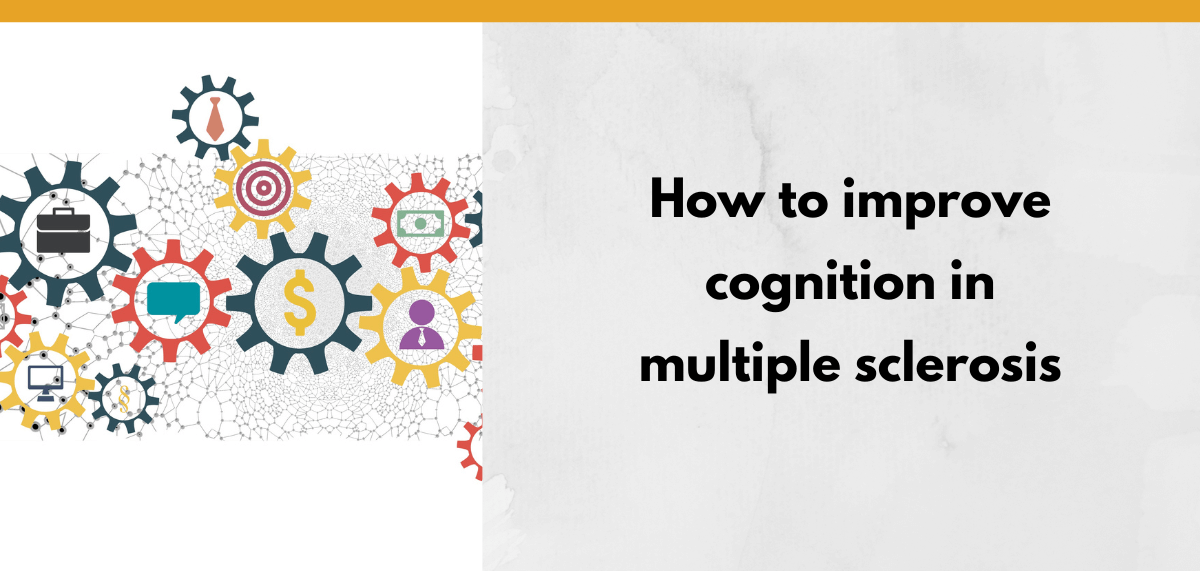According to the National Multiple Sclerosis Society, cognitive decline occurs in 50-60% of people living with multiple sclerosis. Research suggests that it’s possible to improve cognition in multiple sclerosis. People with MS may participate in cognitive rehabilitation to improve learning, memory, and information processing.
Free DIRECT download: Cognitive tips for multiple sclerosis (patient handout). (Email subscribers get free access to all the resources in the Free Subscription Library.)
Outline:
- What is multiple sclerosis (MS)?
- What are the subtypes of MS?
- Cognitive decline in MS.
- Other problems worsen cognitive ability.
- Tips to improve cognition in MS.
- Other resources.
- Related Eat, Speak, & Think posts.
What is multiple sclerosis (MS)?
According to the Mayo Clinic, multiple sclerosis is an autoimmune disease that affects the brain and spine.
“In MS, the immune system attacks the protective sheath (myelin) that covers nerve fibers and causes communication problems between your brain and the rest of your body.”
Mayo Clinic
People who have MS may have mild to severe symptoms, depending on which nerves are involved and how sever the damage is. There is no cure, unfortunately, but treatment can help.
Symptoms vary widely. Here are some symptoms reported by the Mayo Clinic:
- Numbness or weakness of arms or legs (usually same side) or of legs and body.
- Tremor, in-coordination, or impaired gait.
- Vision problems.
- Dysarthria (impaired speech).
- Fatigue.
- Dizziness.
What are the subtypes of MS?
There are various subtypes of MS. The Multiple Sclerosis Trust offers a clear description of the types of MS in this infographic. Or check out this video from the Multiple Sclerosis Association of America:
The most common type is Relapsing-Remitting Multiple Sclerosis (RRMS), which affects 90% of people living with MS. The onset of symptoms is rapid, occurring over a period of hours or days. Symptoms persist for days or weeks, then disappear partially or completely with or without treatment.
People then experience a period of remission in which they don’t experience symptoms for weeks, months, or years before symptoms occur again. Treatment may help symptoms from worsening over time.
Some people with MS develop Secondary Progressive Multiple Sclerosis (SPMS). They reach a point where they no longer have periods of relapses and remissions. At this point, symptoms gradually worsen without a significant remission.
About 10-15% of people with MS rarely if ever experience any periods of remission and are diagnosed with Primary Progressive Multiple Sclerosis (PPMS). People with PPMS experience a gradual increase in symptoms over time, but may have periods of improvement or times when symptoms remain the same.
Cognitive decline in MS
This information is taken from Recommendations for cognitive screening and management in multiple sclerosis care.
Cognitive decline:
- Occurs in 34-65% of people with MS.
- Can occur in any subtype of MS.
- May be detected in short time frames (1-3 years).
- Is more likely detected over 10-20 years.
- Occurs more often in SPMS and PPMS.
The same article reports the following cognitive impairment may occur in MS, with slow information processing and impaired memory being the most common.
- Information processing.
- Memory.
- Complex attention.
- Executive function.
- Verbal fluency
- Visuospatial perception.
- Social cognition.
Other problems worsen cognitive ability
The Recommendations for cognitive screening and management in multiple sclerosis care report that other problems and conditions contribute to cognitive deficits. These problems include:
- Mood/anxiety/depression.
- Poor sleep or sleep problems.
- Fatigue.
- Chronic pain.
- Long-term use of medication to treat overactive bladder.
- Polypharmacy (taking multiple medications).
- Smoking cannabis.
Addressing the above problems can improve cognitive function.
Tips to improve cognition in MS
There are many avenues of opportunity to improve cognition in multiple sclerosis. Look for cognitive rehabilitation from a specialist knowledgeable about MS, such as a neuropsychologist, speech-language pathologist, or occupational therapist.
Cognitive therapy may include training on strategies and exercises to improve processing speed, complex attention, memory, and learning. It may also include training on personalized strategies to use personal strengths to compensate for cognitive deficits.
In addition to cognitive therapy, you can:
- Find interesting and challenging mental activities to do regularly.
- Increase physical movement or exercise, following your physician’s advice.
- Create patterns and routines in your daily activities.
- Use an external memory tool to keep track of information and planned activities.
- Improve your sleep and nutrition.
- Seek treatment for depression and anxiety.
- Ask your MS doctor which medications you can stop taking at each visit.
Learn more about tips to improve cognition in MS in this video from Dr. Aaron Boster:
Or in this video from the National Multiple Sclerosis Society:
Other resources
- Multiple Sclerosis Association of America.
- National Multiple Sclerosis Society.
- Find a neuropsychologist through the APA.
Related Eat, Speak, & Think posts
- Improve auditory memory with this easy exercise.
- Improve daily skills with this easy calendar exercise.
- How to improve short term memory.
- Improve your working memory with 60 quick exercises.
Free DIRECT download: Cognitive tips for multiple sclerosis (patient handout). (Email subscribers get free access to all the resources in the Free Subscription Library.)
Featured image by geralt on pixabay.com.
Lisa earned her M.A. in Speech-Language Pathology from the University of Maryland, College Park and her M.A. in Linguistics from the University of California, San Diego.
She participated in research studies with the National Institute on Deafness and other Communication Disorders (NIDCD) and the University of Maryland in the areas of aphasia, Parkinson’s Disease, epilepsy, and fluency disorders.
Lisa has been working as a medical speech-language pathologist since 2008. She has a strong passion for evidence-based assessment and therapy, having earned five ASHA Awards for Professional Participation in Continuing Education.
She launched EatSpeakThink.com in June 2018 to help other clinicians be more successful working in home health, as well as to provide strategies and resources to people living with problems eating, speaking, or thinking.



Be First to Comment